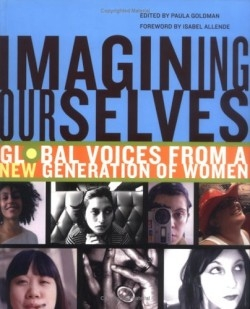
Imagining Ourselves
Global Voices from a New Generation of Women
They’re the best educated, most professionally successful, internationally attuned generation of young women in history, and there are more than one billion of them living in 193 countries, speaking more than six thousand languages. Yet, women in their twenties, thirties, and forties remain the most unrecognized and unappreciated population group on the planet.
The editor of this anthology is one of them. In the fateful fall of 2001, Goldman was armed with a Harvard master’s degree in public policy and little else, save a dream of making a difference in the world. Having worked and traveled internationally, Goldman knew women just like herself who were doing precisely that—taking the initiative to change their own lives and help others improve theirs, despite overwhelming odds and often in the face of cultural and political antagonism. There were, she thought, countless stories to be told, and so, working in conjunction with the International Museum of Women (IMOW), Goldman sent out a call for submissions of artwork and writing that would answer the question, “What defines your generation of women?”
The response was staggering: more than 3,000 replies and 800 formal submissions were received from women representing approximately one hundred countries. The most inspiring and thought-provoking entries are gathered in an electrifying book that showcases the creative talents, celebrates the diversity, and illuminates the political, social, and economic challenges this generation of women are facing and have overcome. The keystone of the IMOW’s “Imagining Ourselves” project, the book, along with an interactive online exhibit, unites the woman in the next cubicle with the woman on the next continent. From Albania to Zaire, their commonality lies in their commitment to change, whether as a person or as a member of society.
Some of the 105 contributors are well known: British author Zadie Smith, American singer Ani DiFranco, former Russian Olympic figure skater Oksana Baiul. Most, however, are not, but to call them “ordinary” or “typical” would be a disservice. From Nigeria’s Hafsat Abiola’s interview with a young woman sentenced by an Islamic court to death by stoning for having a baby out of wedlock, to Malaysia’s Yee-Ming Tan, director of Third Thinking, a corporate culture consultancy, the women are remarkable for the depth of their determination and their unbridled optimism in the face of continued violence, oppression, and poverty. Through their paintings and poems, sculpture and stories, they speak to diverse issues of motherhood and beauty, crime and disease, racism and sexuality.
“As a generation of women,” says Kenya’s Naomi Wanjiku, “we have limitless possibilities. Once we have made achievements as individuals, it will dawn on us that we are all one large, beautiful quilt, made of individual stitches.”
Disclosure: This article is not an endorsement, but a review. The publisher of this book provided free copies of the book to have their book reviewed by a professional reviewer. No fee was paid by the publisher for this review. Foreword Reviews only recommends books that we love. Foreword Magazine, Inc. is disclosing this in accordance with the Federal Trade Commission’s 16 CFR, Part 255.
